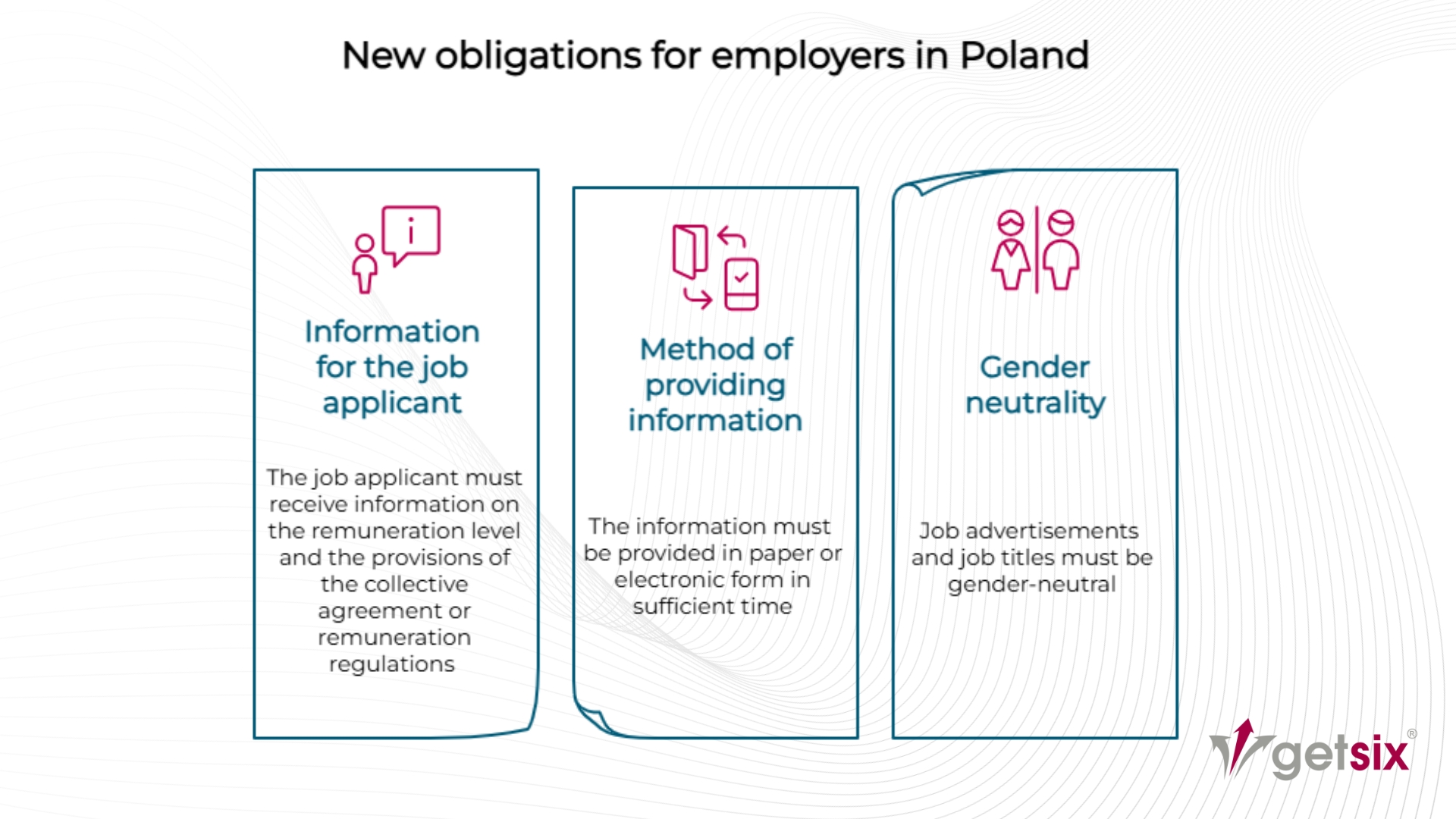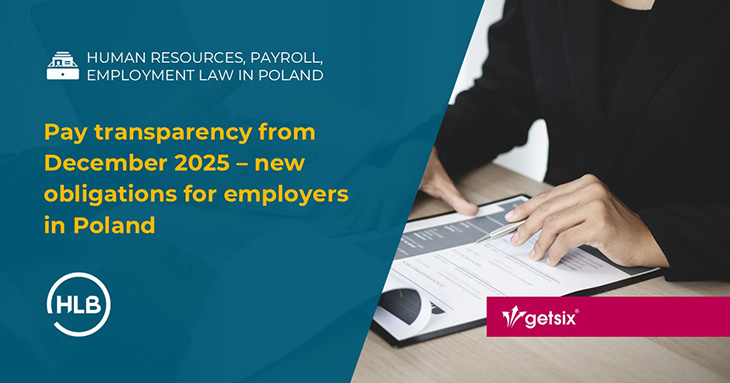Pay transparency from December 2025 – new obligations for employers in Poland
On 23 June 2025, an Act amending the Polish Labour Code was published in the Journal of Laws. It introduces the EU Pay Transparency Directive to a limited extent. The new provisions will come into force on 24 December 2025, which means that employers in Poland have limited time to adapt their recruitment processes and internal documentation to the new requirements.
The key objective of these changes is to increase pay transparency and prevent pay discrimination – particularly in the context of the so-called gender pay gap. Although the current amendment implements only part of the directive’s provisions, it already requires changes to how companies approach recruitment and communication with job candidates.
In this article:
What will change in Poland from 24 December 2025?
The amendments to the Polish Labour Code primarily affect the recruitment stage and introduce new information obligations for employers towards job applicants.

The new Article 183ca of the Polish Labour Code provides that:
- The job applicant must receive information on:
- the remuneration level (initial or within a range), determined based on objective and gender-neutral criteria,
- the relevant provisions of the collective agreement or remuneration regulations (if applicable).
- This information must be provided in paper or electronic form in sufficient time to enable informed negotiations. The employer may do so:
- in the job advertisement,
- before the interview (if there was no advertisement),
- before signing the employment contract (if the data was not provided earlier).
- Job advertisements and job titles must be gender-neutral, and the entire recruitment process must be non-discriminatory.
Prohibition of asking about previous pay
Under the amendment, Article 221 of the Polish Labour Code is also modified. From 24 December 2025, employers will no longer be allowed to ask candidates about their remuneration in current or previous employment relationships.
This is a significant change aimed at preventing the perpetuation of unfair pay levels and ensuring equal opportunities in access to employment.
What else is included in the EU directive? More changes in Poland by June 2026
The June 2025 amendment implements only part of the obligations arising from EU Directive 2023/970 on pay transparency. Full implementation must occur by 7 June 2026. Therefore, further amendments to the Labour Code can be expected in the coming months. The directive covers the following additional areas:
Reporting obligations
- Employers with at least 250 employees will be required to report gender pay gap data annually.
- Companies with 100 to 249 employees will report such data every three years.
- If the gap exceeds 5% and cannot be justified by objective criteria, and is not closed within 6 months, the employer – together with employee representatives – will be required to conduct a joint pay assessment.
- Reports will be available to employees and supervisory authorities (e.g. labour inspectorates).
Liability and sanctions
- The directive allows for financial penalties to be imposed on employers who violate the new provisions – in Poland, these may range from PLN 1,000 to PLN 30,000.
- In pay discrimination claims, the burden of proof will lie with the employer.
- Employees will be entitled to claim compensation for unpaid wages and damages for harm suffered.
How to start preparing now?
Although the full implementation of the EU directive will only take place in 2026, it is advisable for employers in Poland to start preparing already. The period until December 2025 is not only a time to comply with the new legal obligations but also a good opportunity to reorganise pay policies and update recruitment procedures in line with the direction set by EU law.
1. Providing remuneration information to candidates
- It is recommended to include specific salary ranges or amounts in job ad templates.
- A standardised document containing pay conditions should be developed and shared with candidates before interviews.
- Recruiters may need training on how to communicate salary information in line with the new legal requirements.
2. Neutral job postings and titles
- Job titles should be reviewed and, if necessary, standardised in a gender-neutral way.
- HR and recruitment teams should be equipped with internal language guidelines to ensure inclusive communication.
- Care should be taken to align the new language with the existing employer branding.
3. Discontinuing questions about pay history
- Recruitment documentation and interview scripts should no longer include questions about previous pay.
- Neutral alternatives such as asking about salary expectations or preferred salary levels should be adopted.
- It is essential to ensure consistency in recruitment practices – including informal conversations involving various stakeholders.
Upcoming changes – the next step
The obligations currently introduced into Polish law represent only the first stage of implementing EU regulations. In the coming months, we can expect additional changes, including reporting obligations, penalties for non-compliance with pay equality, and new information rights for employees.
Therefore, now is the time to:
- organise pay data within the company and prepare it for future reporting,
- conduct an internal pay equality analysis,
- plan communication activities that promote transparency and equal treatment.
Well-implemented foundations will allow organisations to smoothly navigate the next phases of legislative change and avoid having to implement changes under time pressure.
If your company operates in Poland and needs support in the area of HR and payroll – we offer comprehensive services, including compliance with labour law, documentation handling, and payroll consultancy. Feel free to contact us.
From 24 December 2025, the first provisions on pay transparency will come into force in Poland, covering information duties towards candidates and gender-neutral recruitment processes. The next implementation phases of the EU directive are planned until 7 June 2026 and will include reporting, sanctions, and enhanced employee protections.
It is worth using this time to review procedures, analyse pay structures, and implement systems that will support compliance with future obligations. These changes are not just a regulatory challenge, but also an opportunity to build a more transparent, fair, and trustworthy workplace culture.
Legal basis:
- Act of 4 June 2025 amending the Labour Code (Poland)
- Directive (EU) 2023/970 of the European Parliament and of the Council of 10 May 2023 to strengthen the application of the principle of equal pay for equal work or work of equal value between men and women through pay transparency and enforcement mechanisms
If you have any questions regarding this topic or if you are in need for any additional information – please do not hesitate to contact us:
HR & PAYROLL DEPARTMENT

BARBARA
ROZWADOWSKA
Head of HR & Payroll Department
Department / Senior Manager
getsix® Group
***














